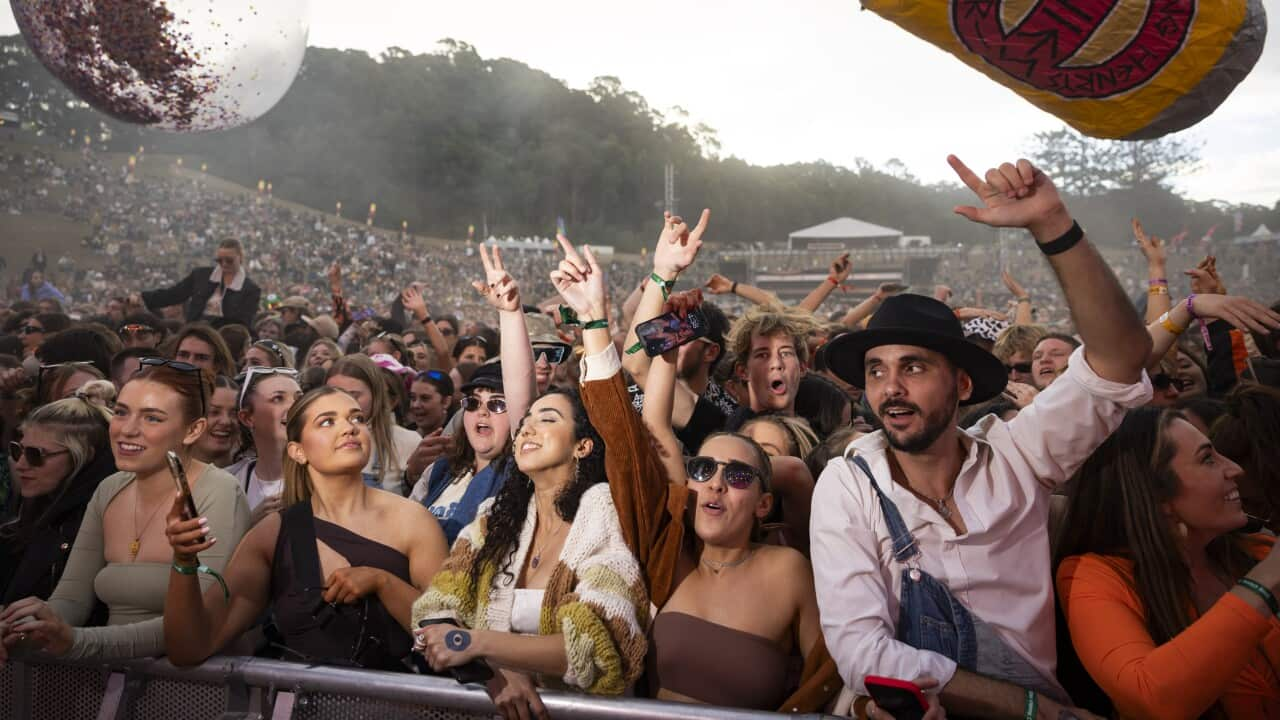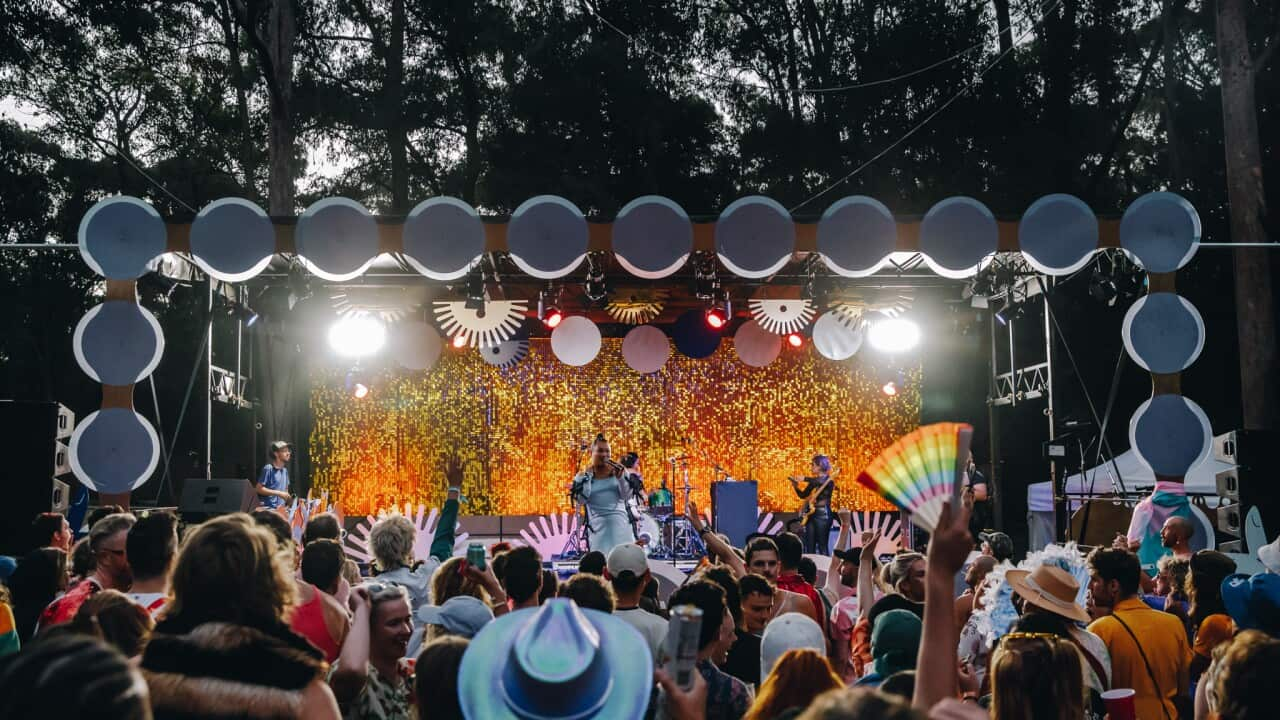It's a bad day for a music festival.
Rain pours down as patrons arrive, and there's nowhere to escape the storm.
Once everyone's socks, shoes, and clothes are soaked through, the weather switches on a dime: The sun beats down and quickly reaches a swampy 30 degrees.
But the conditions haven't deterred fans.
"It adds to the experience," says Sandy, who is attending the festival with her two daughters.
It's an absolute good day.Sandy
Around 30,000 people are at Centennial Park for the Sydney leg of Good Things, a metal, punk, and alternative music festival.
It's one of the few Australian festivals still going ahead in 2024.

Nearly two-thirds of major music festivals scheduled for 2024-25 have been cancelled or postponed. Source: SBS News
The trend has prompted a federal government inquiry aimed at saving the live music industry, with venue managers, industry groups, and festival organisers citing increasing costs and low ticket sales as some of the big challenges they’re facing.
"Almost every line item on the budgets we have has gone through the roof," says Chris O'Brien, promoter for Good Things and Knotfest, Australia's two remaining metal music festivals.
"We have to manage that, and then manage the ticket price and try and get it to a level where we think the punter will still happily pay, but the festival can remain afloat and be financially successful, which is easier said than done."
Despite the challenges, these metal festivals are still going ahead while many have been axed.
What sets metal festivals apart?
Heavy music is the reason Annie and Elke became best friends.
"We met in high school. She showed me a couple of bands, and we've been going to shows ever since," Annie says.
Like many metal fans, the pair feel it's more than just music.
"It speaks to us, I think, on a deeper level than, say, hip hop or something like that," Elke says.
A lot of people talk about how this type of music got them out of really dark times — depression, anxiety and whatever.Elke
"I think the fact that we can get to go and stand in a crowd with all these other people shouting the same words, we feel it, and it just really brings us up."
Jack, who's at the festival with his friend Rhys, says many people find a sense of community in the scene.
"You'd think they're the most hardcore-going people, and they're actually just giant softies," he says.
"They're really excited just to meet new people who like what they like. They just want to connect with each other."
Lochlan Watt, who's the lead vocalist of metal supergroup Run and hosted Triple J's heavy music radio show The Racket for 13 years, says metal fans are deeply connected to the genre.
"People don't have so much of a casual relationship with it," Watt says.
"It is such an important part of our lives and our identities. Like, people are happy to work to earn the money to pay to go to these events and support the bands that they love."
It relies on us to survive, and I think we rely on it to survive.Lochlan Watt
Josh Smith is a founding member of the metal band Northlane and a partner at Open Door Management, an artist management agency.
He says there's a real connection made through the music.
"The metal community is really tight both with the artists and the fans," Smith says.
"Metal fans will go to a lot of shows, and they'll buy a lot of merchandise, and they really care about the music that they're listening to.
"It's just a community that cares a lot about the music and is incredibly passionate, and they're not really fair-weather fans."

Not all the reviews of Good Things have been flattering. Source: SBS News / Jennifer Luu
Victoria Police have confirmed they are investigating some of these allegations.
In a statement to PEDESTRIAN.TV, the festival organisers said: "Good Things Festival denounces any and all forms of sexual harassment, misconduct, abuse and assault. Anyone who condones or engages with these abhorrent behaviours is not welcome at our events."
The rise of streaming services
Smith entered the industry at a turning point in 2009.
Around that time, CD sales were plummeting as pirating music online became more common. Now, streaming services are the go-to.
He says the way people consume music has changed festivals.
"I have a theory on this: I think it relates to a reduced listenership of Triple J," Smith says.
"Radio used to play such an important part, and it's by and large being replaced by people listening to music on digital services like Spotify, who, you know, have algorithms that engineer what people listen to."

Australian audiences listening to music on streaming services surpassed radio audiences in 2023. Source: SBS News
"It was a pretty safe bet that if they got a bunch of the artists that were getting the most spins, then people would come," Smith says.
He says now that algorithms play a big part in deciding what people listen to, tastes have become more niche.
"You're seeing that being reflected in line-ups for festivals, absolutely. Like, there's no kind of large-scale, mixed-billed festivals anymore. They're all quite boutique and geared towards a certain demographic of people," he says.
"I think the demographic of people that were interested in hard rock and metal music was always quite a significant part of the community, so we haven't really seen a decrease in attendance."

Josh Smith is one of two guitarists in heavy metal band Northlane, which formed in 2009 in Sydney's Blacktown. Source: Supplied / Kane Hibberd
"You don't really need to be curated to by someone so much. It's just much easier to go and curate your own tastes or have an algorithm do it for you."
Reaching an older demographic
Good Things Festival, like most heavy music shows, attracts an eclectic mix of people.
"People that love heavy music genuinely, they are just music lovers," O'Brien says.
"Accountants, lawyers, doctors, teachers, young kids, people in their 50s and 60s."

Heavy metal appeals to a broad church of music lovers. Source: SBS News / Rania Yallop
Of the 16 main bands in the 2024 Good Things program, six released their first album before the year 2000.
"I need to make sure that there's enough variety in what we're booking so that, you know, 16-year-old kids through to 60-year-old people are happy," O'Brien says.
The headliner, Korn, has been around since 1994.
Smith says metal's ability to bridge generational divides is part of what's special about the genre.
"People at that age group [over 40s] that are huge metal fans, if one of their favourite all-time artists is headlining a festival, they're probably not going to miss it."
Not all metal festivals are thriving
After running Destruct Agency for more than a decade, Matt Wale decided to produce his first music festival.
"The Australian metal scene has been very dominated by a few small players," he says.
"We thought it was time to give it a shot."
LISTEN TO

How heavy music fans are helping keep Australian festivals alive
SBS News
10:28
Borderline Destruction Festival travelled up Australia's east coast in 2023, but it won't be coming back this year.
"It's tough right now," Wale says.
Watt says part of the reason smaller local festivals are struggling is the influx of international tours following COVID-19 border reopenings.
"It was like there was a backlog of bands that were wanting to get out here and tour internationally, and it just kind of feels like that since the damn wall broke, it just hasn't stopped flowing."
Wale agrees it's forcing the smaller scene out.
"People have got to make a choice between paying the rent and going out to a show, or going to a show that they really want to see [with an international act] that might only be here once every three years, versus the local lineup."
He believes there's a place for both local and international acts.
[Audiences] are willing to make their own personal sacrifices to get to shows. I think that's a testament to our kind of scene in our genre.Matt Wale
"If the fans and the local scenes get around it, there's certainly space for it," Wale says.
Personal sacrifice for the sake of art is familiar territory for Watt, who often goes into debt to go on tour.
"I got in my band to a point where it was kind of skirting along the break-even line," he says.
"We had a couple of line-up changes before the last tour that we did and had to rebook a bunch of flights and a bunch of extra practices and things like that, and that just completely sank the potential of a break-even on that one."

Lochlan Watt (pictured) says Australian musicians often have to foot the bill for touring and rarely break even. Source: Supplied / Ben Eldstrom
"There's a saying that your favourite band was once a local band — and it's so true," he says.
"If it keeps trending this way, the ceiling that a band can reach is slowly coming down."
Watt says there's a silver lining to that.
At least you know, the people that are doing it and making it happen to local bands that are making the sacrifices to get out there and go on tour, really, really, actually want to be doing it.Lochlan Watt
What can other festivals learn?
What was once a buffet of summer entertainment options in Australia now resembles something more like a school cafeteria.
Smith says the broader industry could learn from the metal scene's resourcefulness.
"I think my industry is really good at making $1 go very far," he says.
"We kind of really pride ourselves on fan-driven experiences, and that's definitely the key to longevity and success in this world."

Metal/alternative and rock/pop/indie festivals have experienced growth in 2024-25, while other genres have contracted. Source: SBS News
"You're making sure that there's at least four or five bands that people would love to see, and that gets them across the line, and then there's generally three or four other acts that they're interested in, and then they'll find new acts."
He also focuses on booking bands with a proven track record in Australia.
"They're in different genres, but they all have ticket-selling histories, so we know their fans will pay money to go and see them live," O'Brien says.
For metal fans Annie and Elke, there's nothing that will stop them from attending live music.
"Ever since COVID, like, we didn't even think that we'd ever get this opportunity ever again. So now that I see shows coming up, I always love to go," Elke says.
"Plenty more to go — until we're 80 or 90 or 100."
If you or someone you know wants to talk about sexual assault or harassment, family or domestic violence, call 1800RESPECT on 1800 737 732 or visit . In an emergency, call 000.




